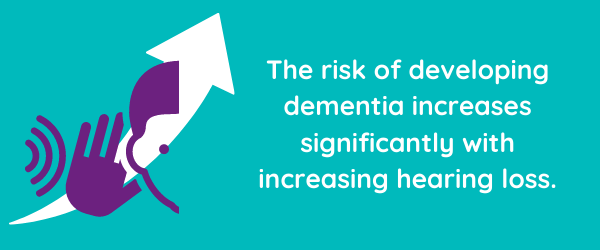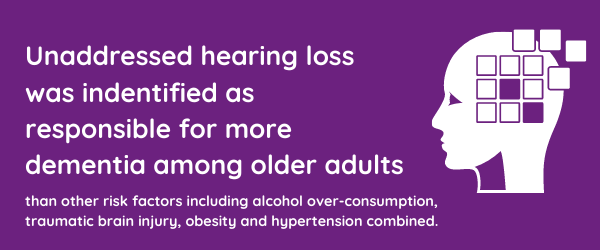In March 2021, the Hearing Care Industry Association (HCIA) published a white paper, Dementia, Hearing Loss and Hearing Care: Saving Australia’s Minds. Prepared by Mark Laureyns, the paper highlights the scientific link between hearing loss and cognitive decline, and the positive impact early hearing care intervention can have on reducing the risk of dementia.
About Dementia

Dementia Australia describes the condition as a collection of symptoms that are caused by disorders affecting the brain. It is not one specific disease. It affects thinking, behaviour and the ability to perform everyday tasks. Brain function is affected enough to interfere with the person’s normal social or working life.
Dementia is now the second leading cause of death in Australia and the leading cause of death among women. It is a highly visible disease, with over 472,000 people suffering dementia in Australia. This number is expected to grow to 590,000 in the next seven years and pass 1,000,000 in 2058. It is also currently estimated that over half of all aged care residents in Australia have dementia.
However, the process of ageing should not be automatically associated with decreased quality of life, depression or cognitive decline to a point of dementia.
Dementia & Hearing Loss

These are the some of the key themes and findings:
- The risk of developing dementia increases significantly with increasing hearing loss
- Hearing loss in mid-life is the largest modifiable risk factor for age-related dementia.
- Unaddressed hearing loss was identified as responsible for more dementia among older adults than other risk factors including alcohol overconsumption, traumatic brain injury, obesity and hypertension combined
- Treatment of hearing loss with hearing aids may delay cognitive decline.
- Providing hearing aids or other rehabilitative services for hearing impairment much earlier in the course of hearing impairment may stem the worldwide rise of dementia.
The importance of hearing care

The scientific community is in agreement that there is strong evidence that demonstrates the relationship between hearing loss, hearing care and dementia. If you defer your hearing care treatment until well into your old age, it is often too late to experience the cognitive benefits. There are greater difficulties for an aged person to effectively and confidently adapt physically and psychologically to any hearing care support.
It is not uncommon to hear someone say, “I have a hearing aid but I never wear it”. This is a disappointing mindset but one that Freedom Hearing works hard to eliminate. Our passionate audiologists and audiometrists work closely with every client to reach your best health outcome. This includes ongoing rehabilitation to ensure all clients are comfortable using their hearing aids, and the devices are always performing optimally.
Freedom Hearing strongly supports the HCIA’s call for a preventative hearing health strategy that will address the link between age-related hearing loss and dementia. With the rising prevalence of dementia, and the devastating impact it has, now is the time to take action.
Australia has an opportunity to lead the world in life-long hearing health care by actively funding those in mid-life (40-64 years) to have their hearing tested and when appropriate, access to hearing aids and associated services.
If you would like to discuss your hearing with an audiology professional, book a free hearing assessment now at your local Freedom Hearing clinic.

